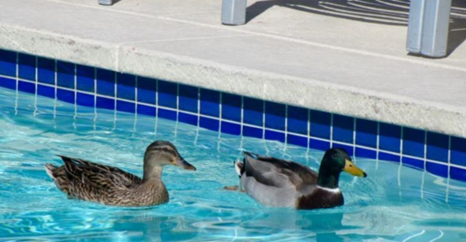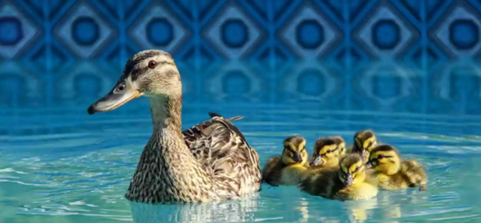Why Are Ducks Attracted to Swimming Pools?
Ducks are naturally drawn to water sources for basic survival needs such as drinking, bathing, and searching for food. Your pool, with its clear, refreshing water, likely looks like an ideal spot for these creatures. Furthermore, manicured lawns around the pool provide an easy place for ducks to land and escape predators. While their presence may seem harmless, it can lead to several problems, such as contamination of your pool water with bacteria, algae, and debris. Understanding why ducks are attracted to your pool is key to implementing effective deterrents that will keep your pool a clean, welcoming space for humans, not wildlife.
Effective Strategies to Deter Ducks from Your Pool
Install a Pool Cover
One of the simplest and most effective ways to keep ducks away from your pool is by installing a pool cover. A high-quality, durable cover prevents the ducks from landing on the water, as it acts as a physical barrier. When choosing a cover, ensure it is sturdy enough to withstand the weight of potential wildlife, and secure it tightly to prevent any gaps that the ducks may find. This method doesn’t just keep ducks away but also prevents debris from accumulating in your pool. Additionally, a pool cover helps maintain your pool's cleanliness, reducing the time and effort spent on regular cleaning.
Use Floating Pool Toys
Using floating pool toys that resemble predators, such as alligators or snakes, is another creative and humane way to deter ducks. These toys are designed to mimic the appearance of natural threats, which causes ducks to perceive the area as unsafe. Ducks, being naturally cautious creatures, tend to avoid areas where they feel threatened. Place the toys strategically around the pool and change their positions occasionally to maintain the illusion of a predator. Not only is this method effective, but it also adds a fun and decorative element to your pool area. It’s a simple, cost-effective solution that doesn’t require much maintenance.
Employ Motion-Activated Sprinklers
Another effective way to deter ducks from your pool is by using motion-activated sprinklers. These devices are placed around the pool’s perimeter and automatically spray water when motion is detected. When a duck approaches, the sprinkler goes off, startling the bird without causing harm. The sudden burst of water is usually enough to send the ducks fleeing. This method is both humane and effective, as it doesn’t harm the ducks but creates a strong deterrent. Additionally, motion-activated sprinklers can double as lawn irrigation systems, making them a practical investment for both keeping ducks away and maintaining your garden.
Maintain a Clean and Unattractive Pool Area
Maintaining a clean and unattractive pool area is essential in deterring ducks. Ducks are often attracted to pools that have debris floating on the surface or are surrounded by overgrown grass and bushes. By regularly cleaning your pool and surrounding area, you remove potential food sources and nesting spots that attract ducks. Make sure to skim the pool daily to remove leaves and debris. Trimming grass and bushes around the pool will also help reduce the area’s appeal. Keeping the pool area tidy and free from food scraps, such as bread crumbs or birdseed, is an easy and effective deterrent to keep ducks from visiting.
Install Physical Barriers
Another practical method for preventing ducks from entering your pool area is by installing physical barriers such as fences or netting. These barriers act as a strong deterrent, preventing ducks from entering the pool altogether. Choose materials that are durable and weather-resistant to ensure they last over time. The barriers should be tall enough to prevent the ducks from flying over or slipping through any gaps. Additionally, consider using mesh netting, which is fine enough to block even small birds from entering. Physical barriers are a long-term solution, providing reliable protection from ducks and other unwanted wildlife.
Utilize Ultrasonic Repellents
Ultrasonic repellents are devices that emit high-frequency sounds which are inaudible to humans but disturbing to ducks. These sounds create an uncomfortable environment for the birds, prompting them to leave the area. Ultrasonic devices are easy to install and maintain, making them a convenient solution. Position several units around the perimeter of your pool for optimal coverage and effectiveness. While these devices work consistently over time, it’s important to regularly check that they are functioning properly. This method is not only humane but also discreet, as the sound is undetectable to people and won’t disrupt your peaceful pool environment.

Common Mistakes to Avoid When Deterring Ducks
While trying to keep ducks away from your pool, there are some common mistakes you should avoid. First, do not use harmful chemicals to deter the ducks, as this could be dangerous for them and other wildlife. Methods like sticky gels or spikes can cause harm, which should be strictly avoided. Secondly, never rely on just one deterrent method. Ducks can become accustomed to a single method over time, reducing its effectiveness. To maintain long-term results, it’s important to combine multiple strategies, such as using a pool cover, motion-activated sprinklers, and floating toys. Lastly, ensure that your deterrents are humane and legal to avoid potential legal complications.
Conclusion
Keeping ducks away from your swimming pool is essential to maintaining a clean and enjoyable environment. By using humane and effective strategies such as pool covers, motion-activated sprinklers, and floating toys, you can learn how to keep ducks away from swimming pool and ensure that your pool remains duck-free. Regularly maintaining a tidy pool area and utilizing physical barriers or ultrasonic repellents will enhance the effectiveness of your deterrent methods. Avoiding harmful methods and combining several deterrents will provide lasting results. With these strategies in place, your pool will stay clear of unwanted visitors, allowing you to enjoy a pristine swimming experience all season long.
FAQ:
How long does it take to implement these deterrent methods effectively?
The implementation time varies with the method. Installing a pool cover or setting up physical barriers can be done in a few hours. Motion-activated sprinklers and ultrasonic repellents might require a bit more time for setup and calibration. Generally, you should start seeing results within a few days to a week as ducks learn to avoid your protected pool area.
Are these methods safe for other wildlife and pets?
Yes, these methods are designed to be humane and non-intrusive. Motion-activated sprinklers and ultrasonic repellents specifically target ducks without causing harm to other wildlife or pets. Pool covers and floating toys are also safe for humans and animals alike. Always ensure that barriers and devices are properly installed to guarantee safety for all.
Can these strategies be used year-round?
Absolutely. The strategies mentioned can be employed throughout the year. However, you might need to adjust or combine different methods depending on seasonal changes and the specific habits of local duck populations. Regular maintenance and monitoring ensure long-term effectiveness.

